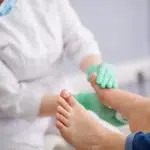Fungal Disease Awareness Week, observed in early October, focuses on fungal diseases. These are generally caused by inhaling fungi spores. Symptoms include an infection in the lungs or on the skin. Often undiagnosed, more than 300 million people worldwide suffer from fungal diseases. Events and activities during the week focus on identifying and diagnosing them early enough to provide life-saving treatment. The U.S. Centers for Disease Control (CDC) sponsors this week.
Fungal Disease Awareness Week timeline
CDC launched the first Fungal Disease Awareness Week in early October.
An outbreak of histoplasmosis, caused by the fungus histoplasma, was discovered at a prison in Illinois — affecting nearly 80 inmates.
Scientists determined that there was an explosion in growth of fungi on the earth right after the extinction of dinosaurs.
How to Observe Fungal Disease Awareness Week
Share a meme
It may seem trivial, but sharing a meme on social media might just catch someone's attention and prompt them to have a doctor look at a rash. The CDC makes memes available on its website for sharing.
Get educated
The CDC makes comprehensive information about fungal diseases available on its website. Check it out and learn about warning signs.
Strengthen your immune system
While anyone is susceptible to fungal disease, those with weaker immune systems are especially vulnerable. Start working on your immune system and improve your overall health by eating better and exercising regularly.
Types Of Fungal Diseases
Ringworm
A common infection that often appears as a circular rash.
Athlete's foot
It usually starts between the toes and is triggered by excessive sweat.
Onychomycosis
A fungal infection of the toenails or fingernails — most commonly caused by yeast or mold.
Mycetoma
Found mostly in rural areas of Africa, Latin America, and Asia. Caused by fungi found in water or soil.
Cutaneous Candidiasis
The most common cause of baby rashes.
Why Fungal Disease Awareness Week is Important
They're infectious
Fungal diseases are infectious — and if not caught and treated early — can be life-threatening. Millions of people around the world die each year because their conditions remain undiagnosed.
It's a complex disease
There are many types of fungal diseases, so it's important for the public and medical professionals to be educated about treatments. Fungal Disease Awareness Week seeks to provide the latest information and research so the condition can be diagnosed and treated properly.
No one is immune
Since fungal diseases are often caused by fungi in the environment, it doesn't matter where you're from or where you live; everyone is susceptible. While most fungi are harmless, some can be deadly. Education is key to recognizing if one may have a fungal disease.


